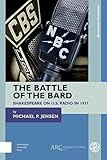The Battle of the Bard : Shakespeare on US Radio in 1937 / Michael P. Jensen.
Material type: TextSeries: Recreational ShakespearePublisher: Leeds : ARC Humanities Press, [2018]Copyright date: ©2018Description: 1 online resource (101 p.)Content type:
TextSeries: Recreational ShakespearePublisher: Leeds : ARC Humanities Press, [2018]Copyright date: ©2018Description: 1 online resource (101 p.)Content type: - 9781641890779
- 9781641890786
- 822.33
- online - DeGruyter
- Issued also in print.
| Item type | Current library | Call number | URL | Status | Notes | Barcode | |
|---|---|---|---|---|---|---|---|
 eBook
eBook
|
Biblioteca "Angelicum" Pont. Univ. S.Tommaso d'Aquino Nuvola online | online - DeGruyter (Browse shelf(Opens below)) | Online access | Not for loan (Accesso limitato) | Accesso per gli utenti autorizzati / Access for authorized users | (dgr)9781641890786 |
Browsing Biblioteca "Angelicum" Pont. Univ. S.Tommaso d'Aquino shelves, Shelving location: Nuvola online Close shelf browser (Hides shelf browser)

|

|

|

|

|

|

|
||
| online - DeGruyter Exploring Emotion, Care, and Enthusiasm in “Unloved” Museum Collections / | online - DeGruyter The Aljubarrota Battle and Its Contemporary Heritage / | online - DeGruyter Mediality in the Middle Ages : Abundance and Lack / | online - DeGruyter The Battle of the Bard : Shakespeare on US Radio in 1937 / | online - DeGruyter Past Imperfect. Medieval Islamic Sectarianism / | online - DeGruyter Early Medieval Hagiography / | online - DeGruyter The Picts Re-Imagined / |
Frontmatter -- CONTENTS -- GENERAL EDITORS' PREFACE -- PREFACE -- A NOTE ON THE TEXT? -- INTRODUCTION: WHAT WAS RADIO? -- Chapter 1. PRELIMINARY BOUTS: SHAKESPEARE ON AMERICAN RADIO BEFORE THE BATTLE -- Chapter 2. IN THIS CORNER: STREAMLINED SHAKESPEARE -- Chapter 3. AND IN THAT CORNER: THE COLUMBIA SHAKESPEARE CYCLE -- Chapter 4. AND THE WINNER IS? AFTERMATH, AFTERLIVES, AFTER SHOWS, AND ALTERNATIVE SHOWS -- AFTERWORD: A BRIEF MURKY CONSIDERATION OF RECREATIONAL SHAKESPEARE AS A CONCEPT IN LIGHT OF THE BATTLE, WITH SOME PERSONAL REFLECTIONS -- SELECTED INDEX
restricted access online access with authorization star
http://purl.org/coar/access_right/c_16ec
Difficult as it is to imagine today, in 1937 America's two leading media companies fought over the right to perform Shakespeare for an American radio audience in an attempt to bring prestige to their networks. The resulting fourteen broadcasts are among the more remarkable recreations of Shakespeare of their time. This lively and engaging book shows the cultural dominance of radio in the 1930s, and tells the story of why the networks each wanted to lord Shakespeare's prestige over the other, how they put their series together, the critical reception, and the cultural impact and legacies of the broadcasts.
Difficult as it is to imagine today, in 1937 America's two leading media companies fought over which had the better claim to Shakespeare. The Battle of the Bard explores this episode in US cultural history when NBC and CBS competed to perform Shakespeare for an American audience in a low-risk setting that they hoped would bring prestige to their networks. The resulting fourteen broadcasts are among the more remarkable recreations of Shakespeare of their time. This lively and engaging book shows the cultural dominance of radio at the time, and tells the story of why the networks each wanted to lord Shakespeare's prestige over the other, how they put their series together, the critical reception, and the cultural impact and legacies of the broadcasts.
Issued also in print.
Mode of access: Internet via World Wide Web.
In English.
Description based on online resource; title from PDF title page (publisher's Web site, viewed 02. Mrz 2022)


